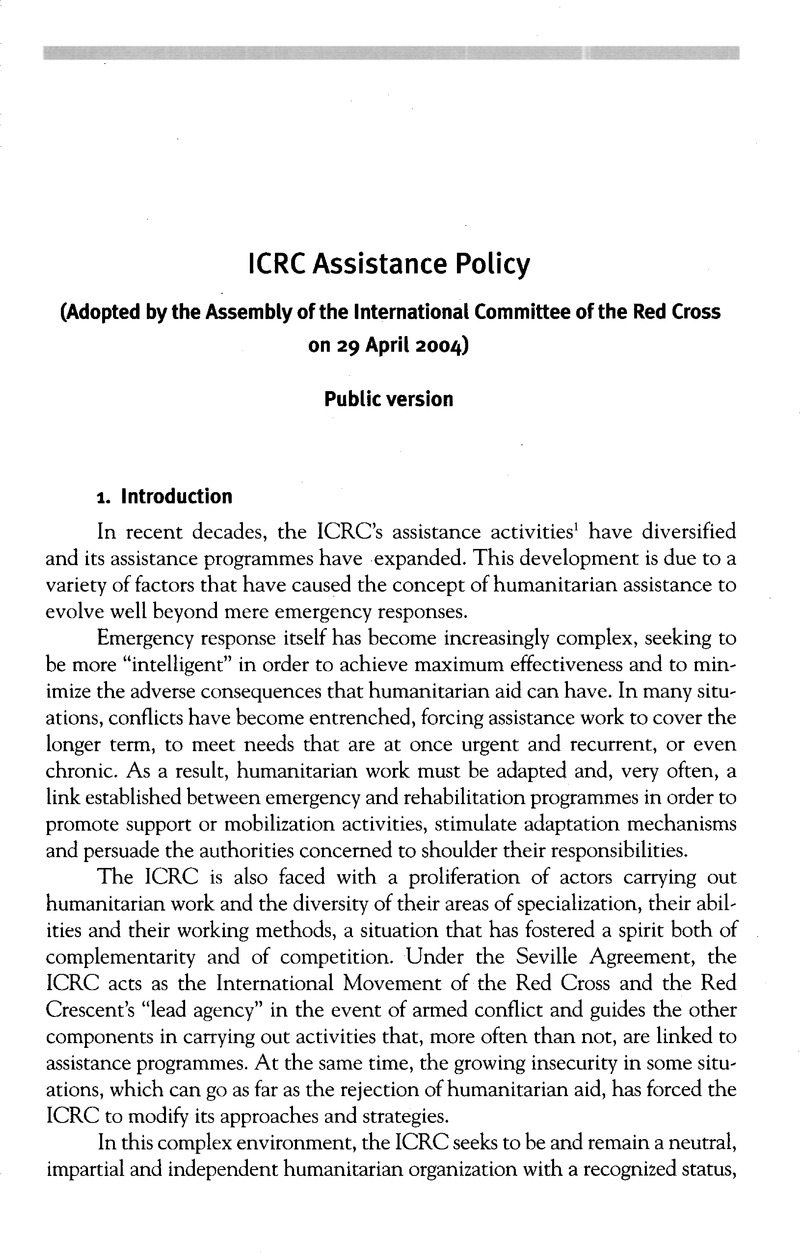Article contents
ICRC Assistance Policy
Adopted by the Assembly of the International Committee of the Red Cross on 29 April 2004
Published online by Cambridge University Press: 27 April 2010
Abstract

- Type
- Faits et documents/Reports and documents
- Information
- Copyright
- Copyright © International Committee of the Red Cross 2004
References
1 Assistance activities are primarily those carried out in the fields of health, water and habitat, and economic security.
2 An integrated approach is the inclusion of all ICRC programmes and activities in an overall strategy – optimal combination of a wide range of activities and modes of action appropriate to a given situation (not to be confused with the concept of integration developed by the United Nations).
3 Hereafter the Movement.
4 Those suffering the consequences of armed conflicts and other violent situations.
5 The ICRC reserves the right to make public statements concerning violations of international humanitarian law if certain strict conditions are fulfilled: (i) these violations are major and repeated; (ii) the ICRC delegates have witnessed the violations with their own eyes, or the existence and extent of those breaches were established by reliable and verifiable sources; (iii) the steps taken confidentially have not succeeded in putting an end to the violations; and (iv) such publicity is in the interest of the persons or populations affected or threatened.
See also the articles elsewhere in this Review by the President of the ICRC, Jakob Kellenberger (on confidentiality) and by its Director of Operations, Pierre Krähenbühl (on the future of neutral, impartial and independent action).
6 Code of Conduct for the International Red Cross and Red Crescent Movement and Non-governmental Organizations (NGOs) in Disaster Relief (adopted by the Council of Delegates of the ICRC in Birmingham in 1993), ICRC Regulations for Personnel on Mission, Rules of Conduct for ICRC Staff on Assignment.
7 World Health Organisation, Definition of health.
8 The gravity of a problem takes into account its severity, its scale and the risk of any aggravation of the problem.
9 ICRC public communication: policy, guiding principles and priority audiences (2004).
10 Such as States, international or regional organizations and private firms or individuals.
11 Action by the ICRC in the event of breaches of international humanitarian law (1981).
12 Includes people displaced within their own countries, refugees and returnees.
13 The ICRC has a residual responsibility towards the persons it has assisted during a conflict, particularly those who may be endangered by a cessation of its work or those the ICRC knew would need a long-term commitment when it began its work. See the ICRC policy paper on ICRC Action in periods of transition (2003).
14 Primary health care is a process in which the community takes part. Carried out in consultation with civil society, it aims to assess health related needs and to implement health activities in the following fields: (1) ambulatory health care using essential drugs; (2) mother and child care, including family planning; (3) expanded immunization programmes; (4) programmes to fight communicable diseases; (5) health and hygiene promotion; (6) health education; (7) mental health; (8) water; and (9) nutrition.
- 2
- Cited by




